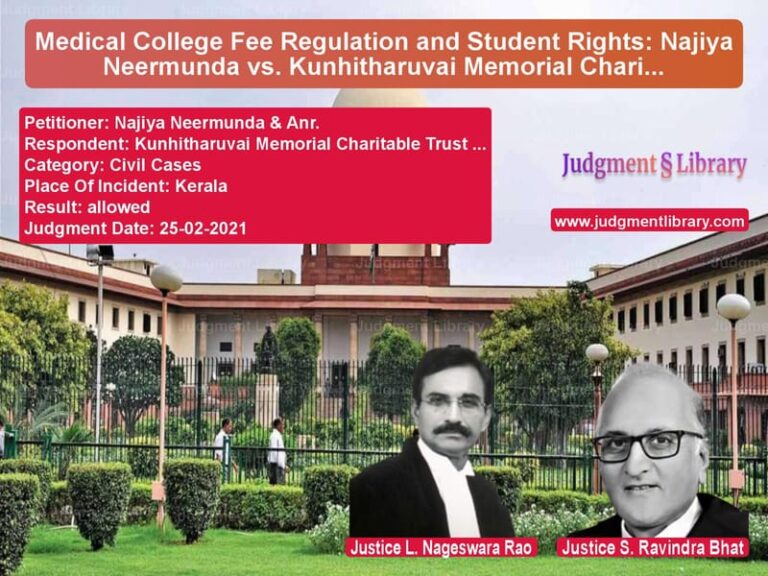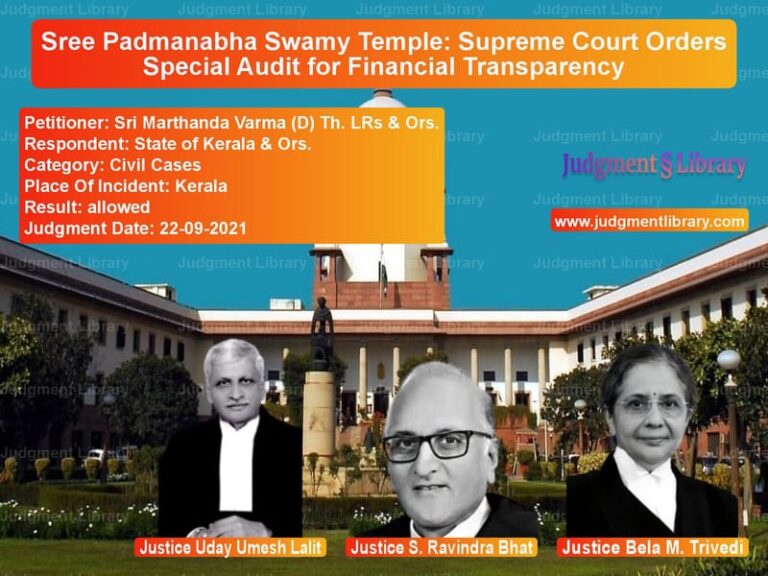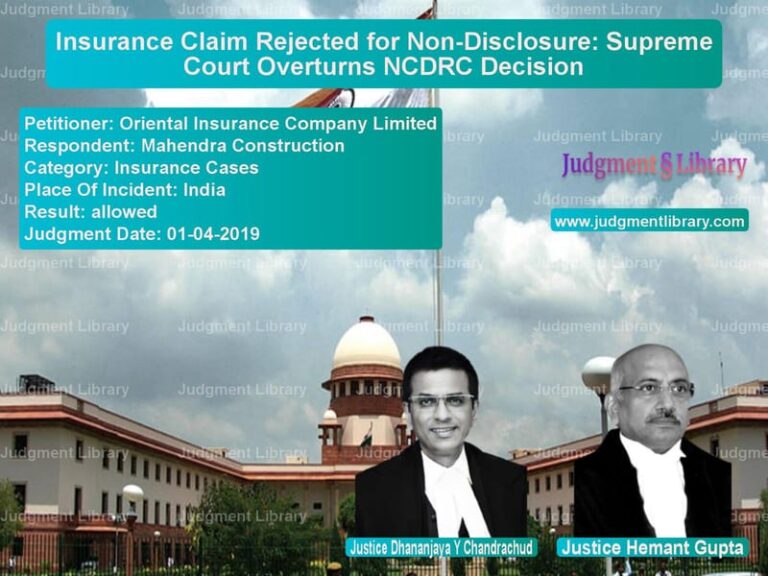Appeal Allowed in Murder Conviction Case: Key Court Insights
This case involves the appeal of four individuals who were convicted under Section 302 read with Section 34 IPC for the murder of S. Ramakrishnan, a 72-year-old man, on the night of October 11, 2000. The appellants were sentenced to life imprisonment by the Sessions Court, and this verdict was upheld by the Karnataka High Court. However, the Supreme Court has now allowed the appeal, setting aside the conviction and ordering the release of the appellants unless they are involved in other crimes.
Factual Background
The case began when an FIR was lodged by S. Ramakrishnan’s son-in-law, S. Ramakrishnan, reporting the discovery of his father-in-law’s body on October 12, 2000. The deceased, who lived alone, had been found with severe injuries to his neck, and it was believed that his neck had been cut with a sharp weapon. The initial investigation revealed that the deceased had been murdered sometime between 6:30 PM and 11:30 PM on October 11, 2000. Additionally, approximately Rs. 3000 was missing from the deceased’s house, indicating that a robbery may have been committed alongside the murder.
The Investigation and Charges
After the FIR was lodged, the police commenced the investigation and found several circumstantial pieces of evidence. This included the identification of the crime scene and the discovery of stolen items, including gold jewelry. The police arrested the accused, and they reportedly confessed to the crime. However, these confessions were made during police custody and were subsequently videotaped.
Medical Evidence
As part of the investigation, a post-mortem was conducted, revealing that the deceased had suffered multiple incised wounds, the most significant being a deep, 13 cm long cut on the front of the neck that severed vital blood vessels, leading to rapid death due to blood loss. This medical evidence strongly indicated that the primary cause of death was the severe injury to the neck, consistent with a sharp weapon.
Read also: https://judgmentlibrary.com/appeal-on-bail-granted-in-criminal-case-supreme-court-judgment-analysis/
The Legal Proceedings
Initially, the appellants were convicted in the Sessions Court for murder under Section 302 and were sentenced to life imprisonment. This conviction was affirmed by the Karnataka High Court. However, the appellants then filed an appeal with the Supreme Court, challenging both the conviction and the sentence.
Key Arguments
Appellant’s Argument: The appellants argued that the evidence against them was circumstantial and insufficient to conclusively prove their involvement in the murder. They contended that the confessions made during police custody should not be admitted as evidence, citing the constitutional protection against self-incrimination (Article 20(3) of the Indian Constitution) and Section 25 of the Indian Evidence Act, which bars confessions made to police officers.
Respondent’s Argument: The State, represented by the prosecution, relied heavily on the confessions made by the appellants during police custody, which were also recorded on video. They also cited the recovery of the stolen gold jewelry as additional evidence linking the appellants to the crime. Furthermore, the prosecution argued that the appellants’ actions in disposing of the stolen goods and their detailed confession left little room for doubt regarding their involvement.
Judicial Reasoning
While the Supreme Court acknowledged the heinous nature of the crime, it focused on the principle that the prosecution must prove the case beyond a reasonable doubt, particularly when relying on circumstantial evidence. The Court noted the flaws in the recovery process of the weapon and the stolen goods, particularly the lack of scientific evidence to corroborate the confessions. The Court emphasized that in cases based on circumstantial evidence, the chain of evidence must be complete and unbroken, and each link should lead to the conclusion of guilt.
In this case, the Court found that the prosecution failed to establish a consistent and reliable chain of evidence. The confessions made by the appellants, although detailed, were made under police custody and could not be treated as conclusive evidence without proper judicial scrutiny. The recovery of the weapon and stolen items was also found to be unreliable due to the questionable timing and lack of independent witnesses to the recoveries.
The Court’s Conclusion
In light of the above considerations, the Supreme Court set aside the conviction and ordered the appellants’ release from prison, unless they were involved in other ongoing cases. The Court’s decision was based on the failure of the prosecution to prove its case beyond reasonable doubt, highlighting the importance of proper legal procedures and the rights of the accused in criminal trials.
Judgment Date: September 30, 2022
Judges: Uday Umesh Lalit, S. Ravindra Bhat, Sudhanshu Dhulia
Petitioner Name: Munikrishna @ Krishna and others
Respondent Name: State of Karnataka
Case Outcome: Petition Allowed
Place of Incident: Ulsoor, Bengaluru, Karnataka
Original File Name: 24079_2020_6_1501_38822_Order_30-Sep-2022.pdf
Total Characters in File: 43371
Petitioner Name: Munikrishna @ Krishna and others.Respondent Name: State of Karnataka.Judgment By: Justice Uday Umesh Lalit, Justice S. Ravindra Bhat, Justice Sudhanshu Dhulia.Place Of Incident: Ulsoor, Bengaluru, Karnataka.Judgment Date: 30-09-2022.
Don’t miss out on the full details! Download the complete judgment in PDF format below and gain valuable insights instantly!
Download Judgment: munikrishna-@-krishn-vs-state-of-karnataka-supreme-court-of-india-judgment-dated-30-09-2022.pdf
Directly Download Judgment: Directly download this Judgment
See all petitions in Murder Cases
See all petitions in Fraud and Forgery
See all petitions in Theft and Robbery Cases
See all petitions in Judgment by Uday Umesh Lalit
See all petitions in Judgment by S Ravindra Bhat
See all petitions in Judgment by Sudhanshu Dhulia
See all petitions in allowed
See all petitions in supreme court of India judgments September 2022
See all petitions in 2022 judgments
See all posts in Criminal Cases Category
See all allowed petitions in Criminal Cases Category
See all Dismissed petitions in Criminal Cases Category
See all partially allowed petitions in Criminal Cases Category







